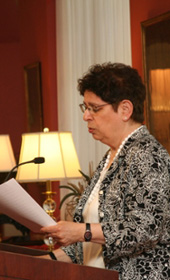Judy Levi's Tribute
A TRIBUTE TO RAE MOSES
And indeed, through all my twenty-nine years at Northwestern, Rae was like a warm, welcoming hearth in a sometimes chilly environment. Everyone who spent time with her would soon perceive (if they didn’t know already) that her presence, her wisdom, her compassion, and her insights offered an unusual and invaluable refuge from the challenges and stresses of university life. This was true for undergraduates, graduates, and postdocs, as well as regular faculty and staff – and that in itself is a testimony to her accessibility and openness, to the breadth of her interest in others, to the value of her company to people of all ages and backgrounds, and to the unique contribution that she made to the university community. She inevitably brought a humane perspective to her interactions, whether in office hours, classroom settings, committee work, department meetings, or CAS faculty meetings. She invested deeply in her students and her colleagues, and that investment was fueled by her natural interest in others, her genuine caring, her generosity in sharing her time and energy, her creativity, and her wonderfully warm heart.
She had a special commitment to helping other women “make it” in the male-dominated academia that she had experienced. This certainly had its origins in being one of VERY few women in the College of Arts and Sciences when she arrived at NU in the mid-60s. (As many of you know, she loved to tell the story about her discovery that when she first came to NU, the university bathrooms that were marked “Faculty” all had urinals in them!) Indeed, when I joined the NU faculty in 1972, there were only about 10 women in the entire College – and of course, we all came to know each other. Rae was involved in every development at the University that supported the expansion of gender equality, from the founding of the Organization of Women Faculty in the early 1970s, to the establishment, administration, and nurturing of a Women’s Studies Program. Active in the creation and development of the residential college system, Rae was directly involved with four different residential colleges, serving as Master of one and as Faculty Associate at three, including – naturally -- the Women's Residential College.
As a teacher, she was in high demand. This was natural because her personal qualities and teaching skills were such a draw, but also because her courses were creative in design – and demanded creativity on the part of the students as well. Among the courses that she pioneered were Language and Gender, Language and Prejudice, Language and Medicine, and a freshman seminar in “Communication and Healing,” with the last two drawing directly on her research in patient-doctor communication. These courses were among the first offered in the Linguistics Department that were designed to show students how learning some linguistics could offer valuable insights into “real-world” topics they were already interested in. She earned both formal teaching awards, and the informal but enduring appreciation of generations of students, who valued her effective teaching, her creative pedagogy, and the flexibility and openness she inevitably brought to their personal interactions. One of our most successful undergraduate linguistics majors, Dan Pink, who worked as a speechwriter for Al Gore soon after graduating from Northwestern, and who later became a best-selling author, cited Rae in an NU-published article as one of the most valuable professors he’d ever had.
Back in the 1970s, since my dissertation research had begun with an analysis of nonpredicating adjectives, my friend and colleague in the Slavic Department, Carol Avins, gave me a T-shirt inscribed, "Adjective Lady." I will be faithful to that appellation by concluding my praise of Rae with a list of adjectives that easily come to mind for characterizing Rae, a list that literally thousands of Northwestern students, faculty, and staff would recognize as accurate descriptors of this remarkable woman: Rae was generous, wise, supportive, caring, judicious, loyal and devoted, grounded, sensible, compassionate, creative and innovative, flexible, humane, open-minded, open-hearted,and nurturing.
By freely offering her gifts to so many, she has changed thousands of lives for the better, and I am deeply grateful that my life has been one of those.
